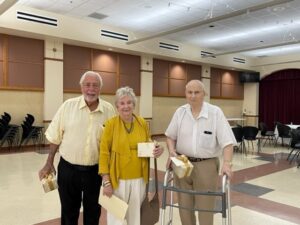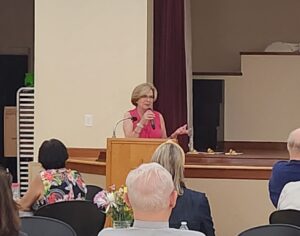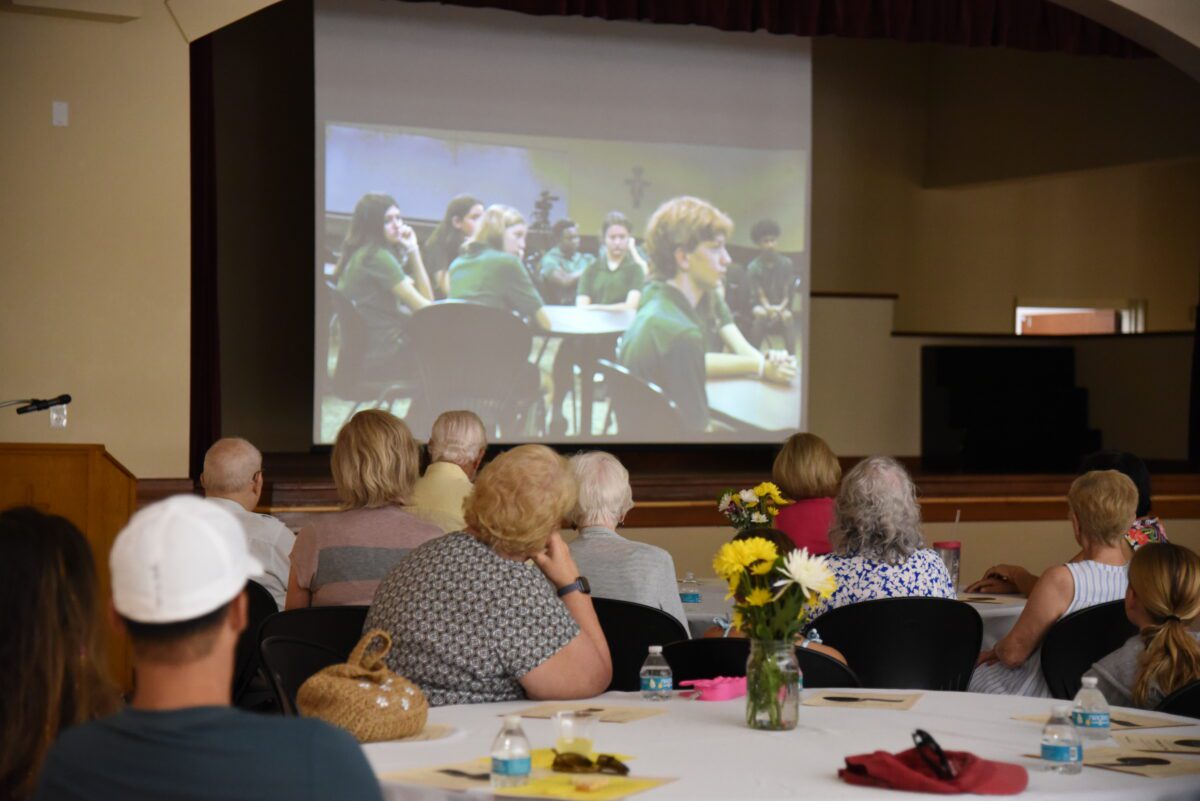WINTER PARK | Eyes riveted on the large screen before them, three Holocaust survivors watch themselves recount the slaughter of six million Jews during World War II. It’s part of the Names, Not Numbers project at St. Margaret Mary Catholic School.
Created by Tova Rosenberg 19 years ago, the mission is to inform young people, so they affect future change. “Wars do not begin with guns,” says Rosenberg, “they begin with words.”
With the help of the Holocaust Memorial Resource and Education Center, last August students began researching the Holocaust, guided by English teacher Leslie Priede and local meteorologist and parent Brian Shields, who taught the students interview techniques. Students wrote questions, learned how to run the camera, and how to edit. A professional videographer helped with finishing touches. These students are “witnesses to the witnesses”—likely the last generation to meet a survivor and hear their stories firsthand.

Four survivors shared their stories.
Harry Lowenstein lived in a small agricultural village of 1,100 people in Germany when the turmoil began. Eventually his family was sent to a concentration camp, receiving one piece of bread per day. Moved to various camps, he often ate snow for water. After the war, he and his brother returned to their home looking for relatives. All were gone.
Laszlo Selly remembers living on a beautiful tree lined avenue in Budapest, Hungary. Then the war began. The yellow Jewish star he was forced to wear immediately singled him out. Friends abandoned him. “That was the first time I realized there were people out there that wanted to hurt me. And that fear has not left me for many, many years afterward,” he said.
Just before the end of the war, the deportation to death camps stopped, “but the killing of the Jews did not,” he said recalling a takeover by the Hungarian Nazi party. “They herded people out, marching them to the Danube River, lined them up and shot them… We heard the cries and the screams of the people when they realized what was going to happen.” Thankfully, they were liberated before his family faced the same fate.
Suzanne Schneider lived in Poland until 1945 when groups of Jews were called to the town square. Those people never returned. She lost family, never seen again. Eventually a lady and her daughter took her in and kept her safe. A few years ago, she returned to Poland to meet their descendants.
Hal Gottschall lived in Holland until 1940 when the Nazis arrived. “We were very lucky we were able to escape,” he said. But his grandmother was not so lucky, killed in Auschwitz.
Also rescued by a Christian family, he lived with them from age five to seven until the war ended and he was reunited with his mother. He recalls running through the streets yelling, “’I’m a Dutch Jewish boy. I’m a Jewish boy.” “I was so happy that I was able to say who I was and that the war was over,” he said.
The documentary also included reflections by the students after hearing the testimonies. One young girl commented, “I can’t believe humans can be so cruel to one another.” Another young man vowed to be an “Upstander not a bystander”, becoming a voice for justice.
“Throughout the Old and New Testament God calls us by name, so our very identity as a child of God, created in His image is rooted in our name,” said Henry Fortier, superintendent of Catholic Schools. “This program helps our students appreciate the dignity of the human person and demonstrates how easily all can be stripped away simply because of skin color, language, cultural or religious beliefs, or extreme nationalist ideologies. It exemplifies the destructive nature of hate against God’s family.”

St. Margaret Mary’s principal, Katie Walsh agrees. “The lessons of the Holocaust teach us the great value and importance of respecting and valuing the dignity of each individual. Hate groups and antisemitism are present in our world currently. The lessons learned are not only related to the Holocaust.”
Since his return to the United States, Lowenstein has shared his story more than 200 times. All the survivors say they “must speak”; they “have the responsibility” to do so.
Selly’s advice to students: “You have to be brave, and you have to be vigilant. You are going to be the future leaders of this country, and as such, you have a responsibility to not let antisemitism or prejudice of any kind and hatred come into this world.” He noted, “My voice is failing. Pretty soon I will be silent for good. So, it is now the job of your generation to tell the whole world that the Holocaust did exist and to make sure that it will never happen again.”
Names, Not Numbers is funded by a prominent national foundation. To learn more, visit namesnotnumbers.org.
By Glenda Meekins of the Florida Catholic Staff, June 9, 2023

